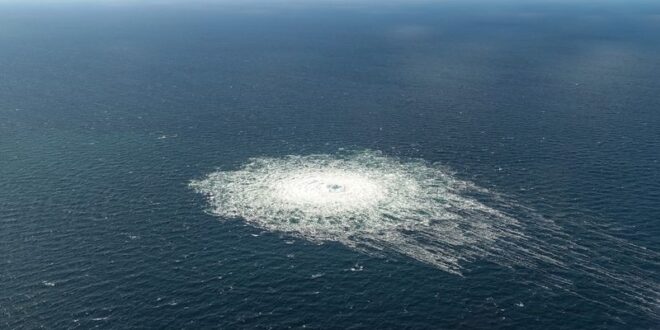STOCKHOLM (Reuters) – Swedish prosecutors said on Wednesday they would drop their investigation into explosions on the Nord Stream 1 and 2 gas pipelines and hand evidence uncovered in the probe over to German investigators.
“The conclusion of the investigation is that Swedish jurisdiction does not apply and that the investigation therefore should be closed,” the Swedish Prosecution Authority said in a statement.
The multi-billion dollar Nord Stream pipelines transporting Russian gas to Germany under the Baltic Sea were ruptured by a series of blasts in the Swedish and Danish economic zones in September 2022, releasing vast amounts of methane into the air.
Danish police have said the pipelines were hit by powerful explosions and Swedish investigators have confirmed that traces of explosives found on site conclusively showed that sabotage had taken place.
Sweden, Denmark and Germany launched separate investigations into the Nord Stream blasts, each tightly controlling information. The Danish and German probes are still ongoing.
“Within the framework of this legal cooperation, we have been able to hand over material that can be used as evidence in the German investigation,” the Swedish prosecution authority said.
Following an extensive investigation, the Swedish prosecutors concluded that nothing had emerged to indicate that Sweden or Swedish citizens were involved in the attack which took place “in international waters”.
“Against the background of the situation we now have, we can state that Swedish jurisdiction does not apply,” Public Prosecutor Mats Ljungqvist said in a statement.
Russia has blamed the United States, Britain, and Ukraine for the blasts which largely cut it off from the lucrative European market. Those countries have denied involvement.
If no conclusive evidence is found by either of the remaining investigations, the mystery behind one of the most significant acts of infrastructure sabotage in modern history could remain unsolved.
(Reporting by Anna Ringstrom, Johan Ahlander and Niklas Pollard in Stockholm, Stine Jacobsen in Copenhagen, Nora Buli in Oslo and Nerijus Adomaitis in London, editing by Terje Solsvik and Philippa Fletcher)
 BeritaKini.biz Berita Viral Terkini di Malaysia
BeritaKini.biz Berita Viral Terkini di Malaysia





